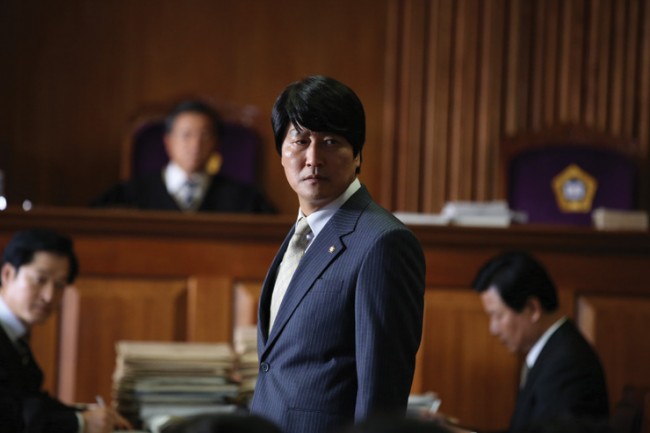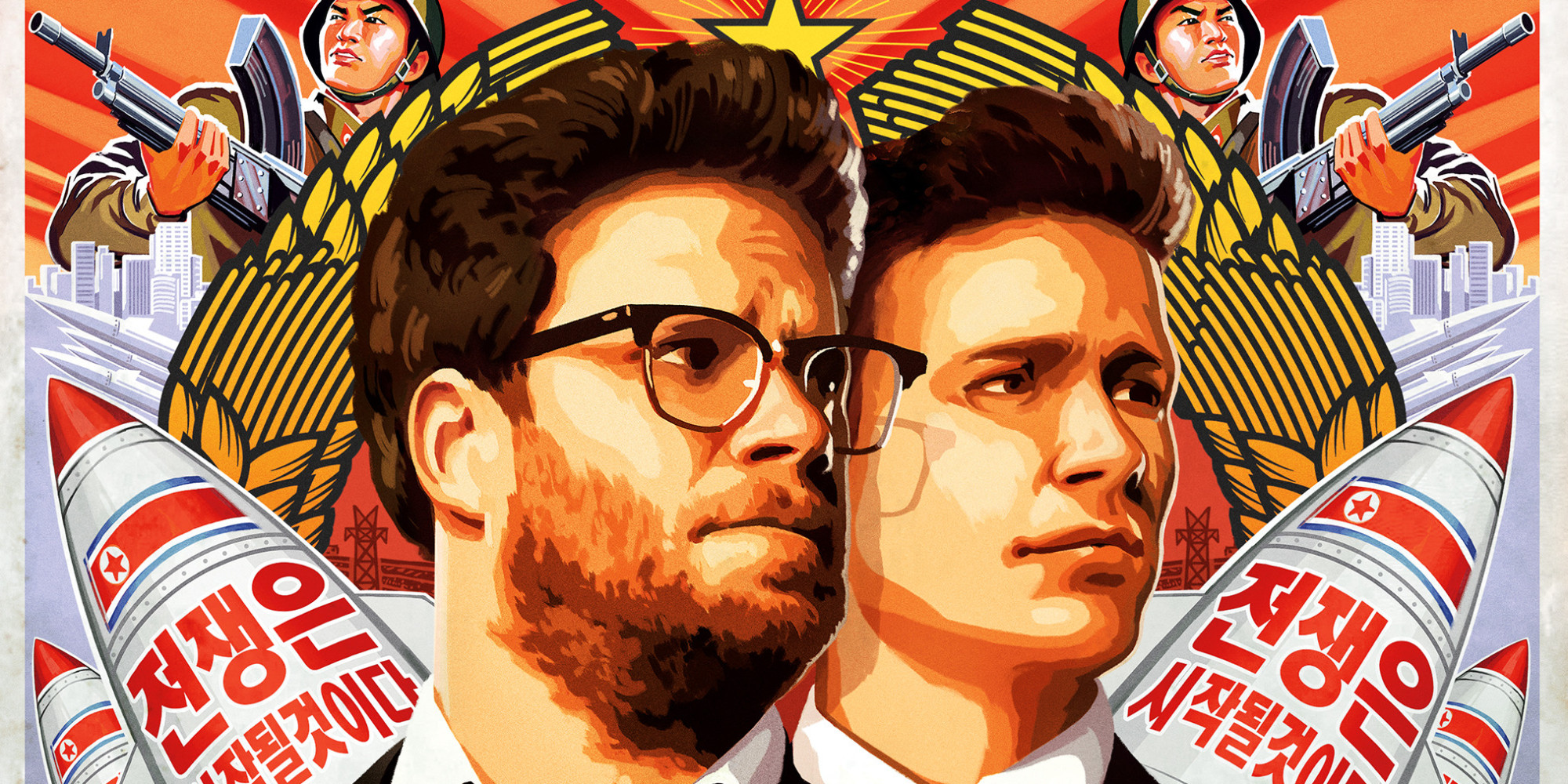This story was originally published in the February 2014 issue of KoreAm Journal.
Already a hit in South Korea, The Attorney, based on a controversial former president’s moral coming of age in the 1980s, makes its U.S. debut this month.
by STEVE HAN | @steve_han
editor@charactermedia.com
The late South Korean President Roh Moo-hyun was a highly polarizing figure during his administration, from 2003 to 2008. But the film inspired by his earlier years, The Attorney, has managed to bring out the Korean masses. It’s a smash hit in Korea, eclipsing 10 million in ticket sales just 33 days after its release. The film hits U.S. theaters on Feb. 7.
The Attorney’s story centers on Song Woo-seok, played by Song Kang-ho, who’s widely known for his leading roles in Joint Security Area, Sympathy for Mr. Vengeance and the recent Snowpiercer, depicting a young Roh-like tax attorney in Busan in the early 1980s. Song, the character, who grew up in a poor family, became a lawyer for one reason: he wanted to become rich. Quite possibly the most successful tax attorney in Busan, Song seemed to have achieved that goal.
But Song’s life takes a 180-degree turn when he learns that Jin-woo, the son of a small restaurant owner who fed Song when he was young and poor, is arrested unjustly. Jin-woo’s arrest in the film is also based on a true incident in South Korea in 1981, called the “Burim Case,” in which military dictator Chun Doo-hwan ordered the arrest of 22 college students with no warrant and charged them for practicing communism-inspired activities.
The Attorney’s director, Yang Woo-seok, a 45-year-old debuting filmmaker, took time to speak to KoreAm about his film, which he said is more about his country’s growing pains during the 1980s than it is about the life of the controversial President Roh, who jumped to his death from a cliff in 2009, amid allegations of bribery.
 Yang Woo-seok, director of The Attorney.
Yang Woo-seok, director of The Attorney.
How would you describe South Korea in the 1980s?
Yang Woo-seok: It was a period of growth for the country. In fact, the growth rate of Korea’s economy was the highest during the 1980s than any other time. But in a way, I think the ’80s for South Korea was similar to an average person’s teenage years. When you’re a teenager, you get taller, physically stronger, and your head gets bigger, both literally and figuratively. There are growing pains and mistakes. Korea went through something similar as a country.
Why did you feel that former South Korean President Roh Moo-hyun was the best person to tell South Korea’s story in the 1980s?
When you study the history of other countries, most of these countries had two separate periods in which they democratized and industrialized. But Korea did both simultaneously in the 1980s. I wanted to create a film that centers on a life of an individual to interpret that particular time in Korean history. There were many human rights activists and attorneys who participated in Korea’s pro-democracy movement. Roh Moo-hyun is someone who helped complete that mission.
 Kwak Do-wan, in his role as Cha Dong-young.
Kwak Do-wan, in his role as Cha Dong-young.
Even though you attended college in Korea during the 1980s, you never participated in student protests or other pro-democracy movements, which were prevalent among young people. You also mentioned in previous interviews that you believe democracy is something that should be earned naturally. So I’m curious to learn why you were so intrigued by someone like Roh, who was at the forefront of public protests.
Curiosity. I wanted to fulfill my personal curiosity. I like to believe that I have a tendency to look at things around the world with an objective point of view. And as a filmmaker, I wanted to tell a story of a person in a historical period. Having been a college student in Korea in the 1980s, I’m certain that South Korea is headed towards a healthier democracy and logical social consciousness now than ever before. I have no doubt about that. My belief is that it’s inevitable for Korea to take a healthier route to righteousness. But during my years in college, Roh piqued my interest because that’s when these things weren’t very certain.
 Yim Si-wan plays student activist Jin-woo.
Yim Si-wan plays student activist Jin-woo.
You said you’ve never met Roh in person. When you saw him for the first time on TV, what were some of your first impressions?
Back in the ’80s, there was something called The Fifth Republic Hearing in Korea. It was a televised public hearing. An attorney would question government officials or other public figures involved in corruption. Roh almost became a national star because no other attorneys in these hearings were as meticulously prepared during their interrogations. He was someone who started his professional career as a tax attorney, who lived a fairly comfortable life while making good money. But he volunteered to become a human rights attorney and later became a congressman. I was attracted by that.
The Attorney is earning so much praise for having great dialogue.
For me, most of the lines in the film are really cliché and obvious. It’s common sense. In fact, the line, “The nation is the people,” which seems to be getting a lot of attention, was taken straight out of the Korean constitution. You know what I think it is, though? I think people relate to lines that are so cliché and obvious because oftentimes, in society, what should be taken as common sense is actually not so common.
One of the most memorable lines in the film is when Song Wooseok yells, “I don’t want my children to live in a world like this.”
A lot like what happened in Korea during the 1980s, illogical things happen anywhere in the world. I dream of a world that can recognize what’s logical and illogical. I wanted to help our audience reach an understanding. Personally, I don’t like it when we turn a blind eye to what’s wrong in society, just because what’s working now seems right. It’s important to realize that something is illogical when it really is.
 Song Kang-ho, who portrays attorney Song Woo-seok, chats with costars Yim Si-wan and Kim Young-ae.
Song Kang-ho, who portrays attorney Song Woo-seok, chats with costars Yim Si-wan and Kim Young-ae.
You’ve stated that you’re concerned about saying this film is based on a true story. Why?
I don’t want the film to be politicized. I also worry that people may think I have a political motive. When you watch the film, there’s nothing political about it. It’s simply a story of a human rights attorney’s life. I didn’t want that to be misinterpreted. In Korea, when you say that a film is based on a true story, people tend to associate every single character in the movie to someone who existed in real life. But from a perspective of a filmmaker, you have to come up with a protagonist and an antagonist to make the film structurally sound. I wanted to avoid the controversy of antagonizing real people, so I focused the story on the life of Roh Moo-hyun and depicted the rest fictitiously. In America, this film would’ve gotten away as a true story, but the Korean film culture is a bit different.
The Attorney will be in American theaters in February. It’s true that the film could be hard to relate to for many people in the U.S., especially those who aren’t familiar with South Korean history in the 1980s.
There’s no doubt that The Attorney is very Korean. But still, its theme is about a person fighting against military dictatorship. Military dictatorship has taken place in so many different areas of the world, especially in Asia and South America. This is a film about a person who fought directly against military dictatorship. For people who understand the significance of such an effort, the film shouldn’t be difficult to relate to.
 Oh Dal-su (as Park Dong-ho), with Song.
Oh Dal-su (as Park Dong-ho), with Song.
If there is one message you want your Korean American audience to take from watching the film, what would it be?
Two things. First, I’d like for them to learn that democracy in Korea was earned during an intense, agonizing period that required a ton of soul searching. Second, I noticed that a lot of people simply remember Roh Moohyun as a former president. But to me, his time as someone who made a lifechanging decision in 1981 to fight against military dictatorship was just as significant as him becoming president in 2003. If Korean American immigrants and their children can think about these things a little bit more, that would be wonderful.
You serve as a mentor for college graduates in Korea. What do you often talk about with young people?
Many of them are on the cusp of entering the workforce. In other words, they’re at their infancy in becoming members of South Korean society. One thing I realized when I was talking to these folks was that they’re already so burnt-out. They operate within a framework that pressures them to fit themselves into what the world requires of them. In a way, I felt like they’ve become senile at such a young age because it looks to me like finding a job is everything there is to life for them. Watching them, I felt more compelled to make The Attorney, because I wanted to make a film that tells a story about how the previous generation has overcome a major obstacle, as an example for today’s younger generation.
___
Featured photo courtesy of Finecut.
This article was published in the February 2014 issue of KoreAm. Subscribe today! To purchase a single issue copy of the February issue, click the “Buy Now” button below. (U.S. customers only. Expect delivery in 5-7 business days).






